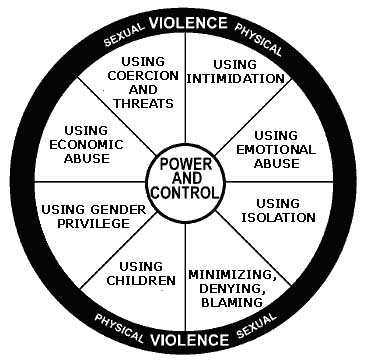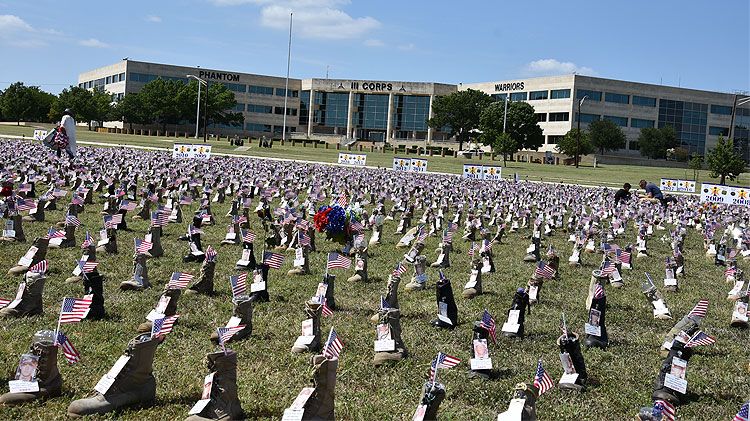- The right to be treated with fairness and with respect for your dignity and privacy.
- The right to be reasonably protected from the accused offender.
- The right to be notified of court proceedings.
- The right to be present at all public court proceedings related to the offense, unless the court determines that your testimony would be materially affected if you, as the victim, heard other testimony at trial.
- The right to confer with the attorney for the government in the case; the right to available restitution; the right to information about the conviction, sentencing, imprisonment, and release of the offender.
- Move to a room with easy access to an exit. Don't go to the kitchen, bathroom or near possible weapons.
- Know the quickest route out of your home. Practice escaping that way.
- Know the quickest route out of your workplace. Practice escaping that way. Domestic violence does not just occur in your home.
- Pack a bag and have it ready. Keep it hidden but make it easy to grab quickly.
- Tell your neighbors about your abuse and ask them to call the police when they hear a disturbance.
- Have a code word to use with your kids, family and friends. They will know to call the police and get you help.
- Know where you are going to go, if you ever have to leave.
- Use your instincts.
- You have the right to protect yourself and your children.
- United States Department of Justice Office on Violence Against Women
- National Center on Domestic and Sexual Violence
- Stalking Resource Center
- Statewide directory for laws, courts, emergency shelters, orders of protection
- Battered Women's Justice Project
- The Family Violence Prevention Fund
- Women's Justice Center– Also is Spanish
- Mind, Body, Spirit Empowered - Materials translated into many languages
- Marriage and Equality – Materials translated into many languages
- Provide crisis intervention and support 24/7/365
- Help file restricted and unrestricted reports
- Talk with you about how safe you are and plan for emergencies
- Give information on temporary financial support and other benefits to victims when the offender is separated from the military
- Coordinate emergency services, including transportation, housing, and food
- Assist in obtaining protective orders
- Accompany you throughout the medical, investigative, and legal processes
- Represent your interests through on-post processes
- Offer information and referral to medical, legal, counseling, and other resources
- Several places you could go if you leave your home
- People who might help you if possible, leave a bag of necessities at their house
- Getting a cell phone
- Opening a bank account/credit card in your name
- How you might leave
- How to take your children with you safely
- Children
- Money
- Keys to car, house, work
- Extra clothes
- Medicine
- Important papers for you and your children
- Birth Certificates
- Social security cards
- School and medical records
- Checkbooks, credit cards
- Driver’s license
- Car registration
- Welfare identification
- Passports, green cards, work permits
- Lease/rental agreement
- Mortgage payment book, unpaid bills
- Insurance papers
- Military Protective Order (MPO)/Civilian Protective Order (CPO), divorce papers, custody papers
- Address book
- Pictures, jewelry, sentimental items
- Items for your children (toys, blankets, etc.)
- Keep a copy of your MPO/CPO at work
- Give a picture of the abuser to security and friends at work
- Tell your supervisors – see if they can make it harder for the abuser to find you
- Don’t go to lunch alone
- Ask a security guard to walk you to your car or to the bus
- If the abuser contacts you at work, save voicemails and e-mails
- Get a cell phone.
- Get a MPO/CPO. Keep a copy with you at all times. Give a copy to the police, your children’s caregivers, schools, and your boss.
- Change the locks.
- Install a security system and outside lights.
- Change your number to be unlisted.
- Use an answering machine/voicemail to screen calls.
- Tell friends and neighbors your abuser no longer lives with you. Ask them to call the police if they see your abuser outside or near your home.
- Tell someone at work what has happened.
- Try not to use the same stores, banks, or businesses that you did when you were with your abuser.
- Find a safe way to speak with your abuser, if necessary.
- Take a self-defense course.
- Go over your safety plan.
- What is Domestic Violence?
-
Domestic abuse is a pattern of behaviors used to establish power and control over an intimate partner through fear and intimidation, often including the threat or use of violence. Abuse is any controlling, hurtful act, word, or gesture that injures another person's body or emotions. Domestic abuse is not a disagreement, a marital spat, a communication or an anger management problem. The violence can take many forms, such as verbal, emotional/psychological, financial and physical and usually escalates in severity. Domestic violence is a people problem, not a gender issue. We assist all victims, male or female.
It is a crime for any person to cause you any physical injury or harm even if that person is your spouse. Spouse Abuse is the assault, battery, threat to injure, kill, other act of force or violence, or emotional maltreatment inflicted by one spouse on the other. No matter what you may believe, nothing you say or do causes your partner to behave violently toward you, and it is impossible for you to prevent your partner's assaults by being the perfect spouse.
Why It's Important To Report Domestic Violence?
- Victim safety
- You cannot stop the violence!
- Allows trained personnel to investigate, assist, assess and document the situation.
- Perpetrator becomes aware that others know of the situation (can start being held accountable).
- Opportunity for both victim and perpetrator to receive help.
- Without intervention, the violence will only get worse!
For Unrestricted Reporting by the victim and by third-party individuals, call +1 (254)287-2273 (CARE)
For Restricted Reporting by the victim, call +1 (254)702-4953
- Types of Domestic Violence
-
Physical
Grabbing, pushing, holding, slapping, choking, punching, sitting or standing on, kicking, hitting with objects, and assaulting with knives, firearms or other weapons.
Sexual
Forcible sexual activity by one's spouse.
Emotional
Threats of violence, mental degradation (name calling, etc.), isolation.
Abuse is Never a One Time Event
The cycle can happen hundreds of times in an abusive relationship. Each stage lasts a different amount of time. The total cycle can take anywhere from a few hours to a year or more to complete.
It is important to remember that not all domestic violence relationships fit the cycle. Often, as time goes on, the 'making-up' and 'calm' stages disappear.
Cycle of Violence
- Tensions Build
- Abuse Takes Place
- Apologies, Excuses, Ammends
- Warning Signs
-
Your partner
- Acts very controlling and embarrasses you with bad names and put downs in front of others.
- Acts extremely jealous of others who pay attention to you.
- Takes your money and/or makes you ask for money.
- Controls what you do, whom you see or talk to, and even where you go.
- Acts like the abuse is not a big deal, it's your fault, or even denies doing it.
Your Child
- Is frequently upset or withdrawn and won't say why.
You
- Become quiet when your partner is around and you seem afraid of making them angry.
- Stop seeing your friends and family members, becoming more and more isolated.
- Often cancel plans at the last minute.
- See your partner violently lose their temper, striking or breaking objects.
- Often have injuries (from violence) that are explained to others as accidents.
- Mention your partner's violent behavior, but laugh it off as a joke
Power and Control
The chart below is a way of looking at the behaviors abusers use to get and keep control in their relationships. Battering is a choice. It is used to gain power and control over another person. Physical abuse is only one part of a system of abusive behaviors.
This chart uses the wheel to show the relationship of physical abuse to other forms of abuse. Each part shows a way to control or gain power.

- Call the Police
-
Why You Want To Call The Police?
- They can protect you from immediate danger and help you and your children get out of the house safely.
- They can arrest the abuser without a warrant, when the police officer has good reason to believe that an assault has taken place or that the abuser has violated a protective order.
- They must advise you of the availability of shelter programs and other services in your area.
- They must write out a police report, which is a detailed account of what happened to you.
- A police report may be used to help prove the abuse occurred, should the charges be filed against the abuser.
- A police report can be used to show good cause for the courts to grant a protective order if you should ever need one.
- Shelters
-
Families in Crisis
Established to provide emergency shelter and support services to victims of family violence and sexual assistance in a protective environment. Services include a 24-hour emergency hotline +1 (888)799-7233 (SAFE), immediate safe shelter, provision of food and clothing, transportation and crisis intervention counseling. Families in Crisis also provides referrals for medical, legal, and social services in the community. Call +1 (254)634-2284 for more information.
Other Shelters
Food, shelter, clothing, school supplies, diapers, and other necessities provided as needed to residents. Case management services to assist residents in obtaining housing, employment, skills training, financial assistance, and legal advocacy.
- Cove House (Copperas Cove) +1 (254)547-4673
- House of Refuge (Copperas Cove)+1 (254)547-6753
- Teach Thenm to Love (Killeen) +1 (254)519-2222
- Court Accompaniment
-
At the victim request the victim advocate may accompany the victim to court proceedings and be present while he/she testifies.
Accompany Victim To All Assault Related Appointments
- Medical exam.
- Interviews with Law Enforcement/Investigators (CID, local police).
- Interviews with legal counsel, trial counsel and defense.
Transitional Compensation
In 1994, Congress required the Department of Defense to conduct a study of Family Member's abuse and its consequences and to identify efforts to reduce victim disincentives to reporting abuse. Congress followed up on its concerns and established the Transitional Compensation program for abused family members of military personnel. The legislation authorized temporary payments for Families in which the absent Soldier has been discharged administratively or by court martial for dependent abuse. Benefit entitlement starts the date the court martial sentence is approved or the date the administrative separation is initiated. Payments are for a minimum of 12 months or until the Soldier's ETS date, whichever period is longer, but may not exceed a maximum of 36 months. TC is centrally funded and managed at Department of the Army level. For details on this program, please call +1 (254)287-3583
- Additional Resources
-
Documents Description Military Protection Orders (MPOs) Unit commanders may issue MPOs as a means to preserve good order and discipline by members of the command.
Process of applying for a Protective Order.

Shoemaker Lane, BLDG 36000
Monday - Wednesday 7:30 a.m. - 4:30 p.m.
Thursday 11 a.m. - 4:30 p.m.
Friday 7:30 a.m. - 4:30 p.m.
Closed Federal Holidays
+1 (254)287-3583
Email Us
The Family Advocacy Victim Advocate Program is a specialized function within FAP providing comprehensive assistance and liaison to and for victims of spouse abuse and sexual assault. The victim advocate serves as the primary POC (integrated within the existing FAP) to insure timely and complete care was provided to victims of spouse abuse and sexual assault. Victim advocates will provide information on resources available to assist victims of spouse abuse and sexual assault. Victim advocates will maintain contact with the victim through out the medical, investigative, counseling, and judicial process.
The Victim Advocacy Program (VAP) provides emergency and follow-up support services to adult victims of domestic abuse. Advocacy services are available to Service members, their current or former spouses, an individual with whom the Service member shares a child, and significant others of Service members who live together. Our services are available twenty-four hours a day, seven days a week.
Our trained professionals are here for crisis response, information on reporting options, medical treatment options, law enforcement’s response, emergency services, safety planning, obtaining military and civilian protective orders, and accompaniment to medical forensic exams and medical appointments, as well as accompaniment to court for orders of protection hearings and trials. Advocates work closely with their civilian counterparts and ensure a personal and smooth transition for victims who do not qualify for ongoing advocacy services within the military community.
If you need help or want more information, contact the Victim Advocacy Program Manager at your local Army Community Service Center.
Reporting Options
The Army is fully committed to ensuring victims of domestic abuse are protected; treated with dignity and respect; and provided support, advocacy and care. The Army strongly supports effective command awareness and prevention programs, and holding offenders accountable.
There are two types of reporting options: Restricted Reporting and Unrestricted Reporting. Personnel should report all suspected cases of domestic abuse promptly, which quickly activates victim services and accountability actions. However, we understand things might not always work that way. Victims might need medical attention or victim services without command or a law enforcement response. Therefore, the Army has implemented a Restricted Reporting Option for victims to confidentially disclose allegations of abuse and receive needed medical treatment and services.
Restricted Reporting
Allows someone who meets VAP criteria and who is experiencing violence in his/her relationship to confidentially disclose the abuse to a Victim Advocate, a Victim Advocate Supervisor, or a Healthcare Provider. When an individual chooses a restricted report, law enforcement is not involved and there is no investigation of the abuse. In addition, the Soldier’s Command is not notified of the abuse and is unable to offer assistance and protection.
The restricted reporting option allows an individual to receive medical treatment, advocacy services and clinical and pastoral counseling. This option allows one to receive needed services, control the release of his/her personal information, and time to consider his/her options.
Under this reporting option, the offender is not held accountable and the abuse may continue. If an assessment reveals a high risk for future injury, a restricted report may not be granted.
Unrestricted Reporting
Victims of domestic abuse who want to pursue an official investigation of an incident should report the abuse to law enforcement, or the alleged offender’s Commander. The unrestricted reporting option provides a victim with the widest array of services available including but not limited to command involvement, law enforcement involvement, medical treatment, advocacy services, and counseling services.
Not all incidents of domestic abuse are the same, and each person who experiences domestic abuse handles the situation differently.
Command Response
Commanders play an integral part in ensuring the safety, health, and well being of our Army Families. Commanders who learn of an incident of domestic abuse are required to notify law enforcement.
Victim’s Rights
Safety Planning
A violent relationship puts you and your children at risk for injury and even death. Developing a safety plan tailored to meet the needs of your family will enable you get out of a potentially dangerous situation. If your children are old enough, mature enough, or even responsible enough to assist you during a violent or potentially violent episode of domestic abuse, you may consider including them in your plan to keep everyone safe. A good safety plan considers which steps to take if you choose to stay in the relationship or if you choose to leave.
Here are some tips during the explosive phase of domestic abuse:
Develop a Safety Plan
Protection Orders
Military Protection Orders (MPO)
Unit Commanders may issue a Military Protective Order (MPO) to ensure the safety of service members, family members, and other individuals from the threat of domestic violence. An MPO is a written lawful order issued by a commander that orders a Soldier to avoid contact with his or her spouse or children. The commander should provide a written copy of the order within 24 hours of its issuance to the protected person, the Military Police and civilian law enforcement. An individual should report violations of the MPO to law enforcement.
Civilian Protection Orders (CPO)
A Civilian Order of Protection is an order signed by a Judge that directs an individual to stop abusing, stalking, harassing and/or committing acts of sexual violence against an individual. An individual may file a CPO against current or former spouse, someone that an individual shares a child in common, an individual with whom you have shared a residence with, someone related to you by blood or marriage or someone with whom you have dated or had intimate relations.
National Resources
Victims of domestic violence and sexual abuse have round-the-clock access to services, including emergency assistance, information, referrals, and ongoing support in accessing medical, behavioral health, legal, and law enforcement services on and off garrisons. Victim Advocates will discuss the option of restricted and unrestricted reports.
Domestic Violence Hotlines
All Army installations have a 24/7 Family Advocacy Program (FAP) Domestic Abuse Victim Advocacy Hotline.
Domestic Abuse Victim Advocacy Program
Standing Against Abuse Together
The Army’s Domestic Abuse Victim Advocacy Program provides comprehensive assistance and support to victims of domestic abuse, including crisis intervention, risk assessment, safety planning, assistance securing medical treatment, information on legal rights and proceedings, and referrals to military and civilian shelters and other resources available to victims. Child advocacy services are provided to non-offending parent/guardians of children when directed by the FAP or by a judge.
What is a Domestic Abuse Victim Advocate (DAVA)?
Domestic Abuse Victim Advocates (DAVAs) are trained professionals who provide non-clinical advocacy services and support to Soldiers and Family members experiencing domestic abuse. DAVAs are on call 24/7 to provide immediate assistance, safety planning, non-judgmental support, and information on available resources.
What is Domestic Abuse?
Domestic abuse is a pattern of behavior resulting in emotional/psychological harm, economic control, and/or interference with personal liberty. The abuser could be a current or former spouse, someone you share a child with, or a current or former intimate partner you’ve shared a home with. Domestic abuse is a crime. So is violating a protective order.
Domestic Abuse Victim Advocates can
How to Keep Yourself Safe
You can take steps to keep yourself and your children safe, and you can prepare to leave an abusive partner. Here are things to consider.
What Should I Do If I Am Thinking About Leaving My Abusive Partner?
Think about the following:
Take the following items with you, if possible:
How Can I Keep Myself Safe At Work?
What Can I Do to Keep Myself Safe If I Have Left My Abuser?

